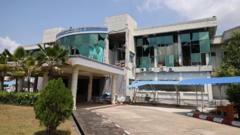**In a major response to last month's destructive earthquake, Myanmar's military rulers have vowed to redesign Nay Pyi Taw to enhance its earthquake resistance and rebuild damaged infrastructure.**
**Nay Pyi Taw's Reconstruction: Myanmar's Capital to Undergo Major Redesign Post-Earthquake**

**Nay Pyi Taw's Reconstruction: Myanmar's Capital to Undergo Major Redesign Post-Earthquake**
**Military authorities announce complete redesign of Nay Pyi Taw following devastating earthquake damage.**
The capital city of Myanmar, Nay Pyi Taw, is set to undergo significant reconstruction efforts following the severe earthquake that struck the region on March 28. The country's military leader, Senior General Min Aung Hlaing, confirmed during a government meeting that the buildings in the capital that collapsed during the earthquake suffered major damage due to their construction on unstable soil. As part of the rebuilding process, officials will conduct soil tests and enforce that new office buildings meet stringent earthquake-resilient standards.
Reports indicate that approximately 70% of government buildings sustained damage from the earthquake, leading several offices to temporarily relocate to Yangon. The magnitude 7.7 quake not only affected Myanmar but was also felt in neighboring Thailand and south-west China, resulting in over 3,500 fatalities and over 5,000 injuries in its wake.
Originally established in 2005, Nay Pyi Taw, which translates to "seat of the king," was built by the military government at that time and covers an area four times the size of London, yet houses only a small fraction of the population. The rationale behind relocating the capital 370km from the previous largest city, Yangon, remains uncertain. Nay Pyi Taw's infrastructure displays characteristics of a typically planned capital city, with expansive roads and partially occupied commercial developments.
Amidst ongoing civil unrest and conflict in the country since the 2021 coup, the military declared a 20-day ceasefire on April 2, aiming to facilitate relief operations following the earthquake. However, reports have emerged of continued military operations against rebel-controlled zones. The aftermath of the earthquake has left many critical government buildings, such as the Ministry of Labour and Ministry of Planning, in ruins, and reconstruction efforts are expected to take years to complete.
As part of the ongoing recovery, various government departments are relocating their offices. The Ministry of Foreign Affairs and the Ministry of Tourism have already set up in Yangon, while others are moving to temporary "hotai" structures in Nay Pyi Taw. Efforts are also underway at the National Museum to safeguard valuable cultural materials, including rare inscriptions and thousands of books, in the face of ongoing challenges.


















